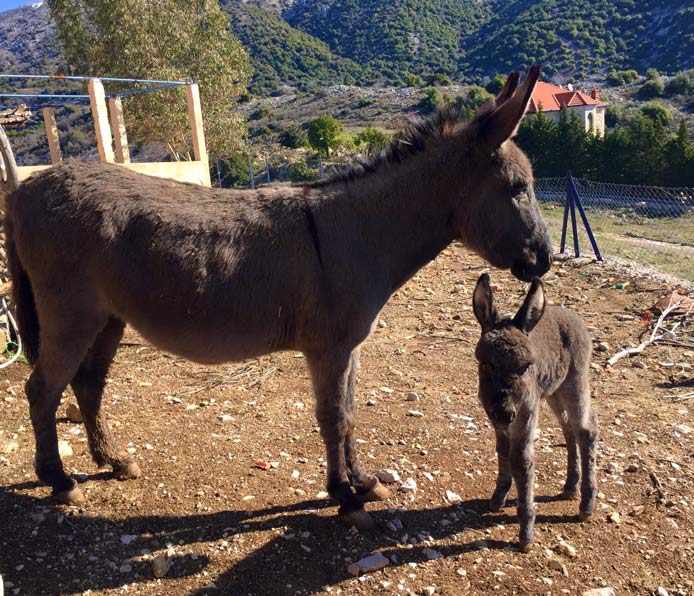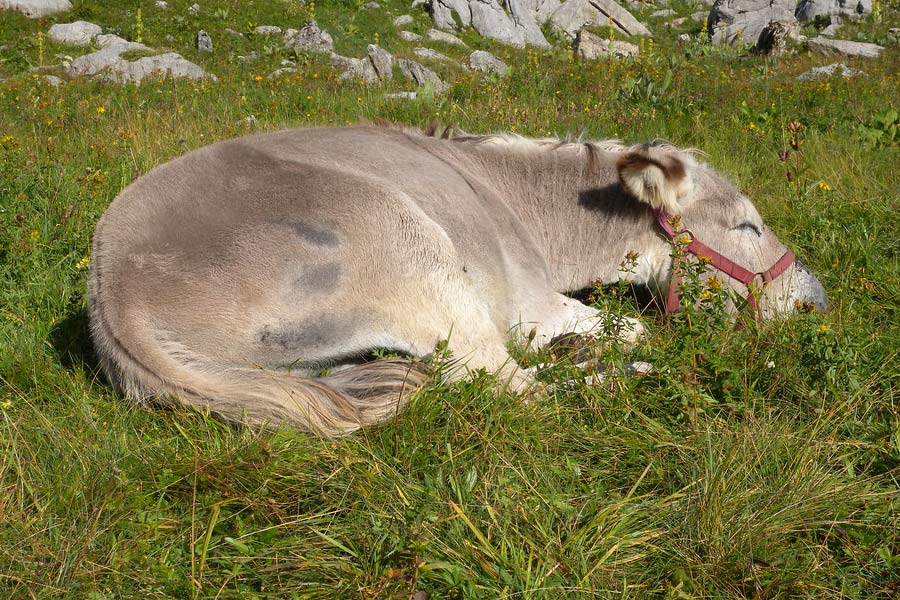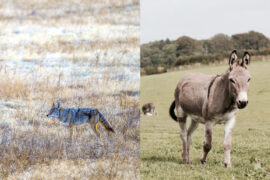If you’ve ever driven by a farm or been around donkeys, you’ll have noticed that they sometimes sleep standing up. But how long do donkeys sleep for? Donkeys need about three total hours of sleep per day and thirty minutes of that needs to be REM, or Rapid Eye Movement sleep, so that the donkey can recharge. The three hours of sleep that donkeys need don’t necessarily need to be consecutive, one right after the other. Instead, donkeys take naps of varying lengths throughout a 24-hour period to reach their necessary three hours of sleep per day.
How do donkeys sleep and how long do donkeys sleep?
Just like humans have their preferred way of sleeping, donkeys also have their favorite ways of sleeping. Most often, donkeys choose to sleep standing up. In this position, they are able to get a light sleep while still maintaining some degree of awareness of their surroundings. As prey animals, they must maintain vigilance, so they don’t get snuck up on by predators. A donkey standing and sleeping could sense the danger and flee or fight very quickly if a predator were to approach.
Only when they feel they are in a completely safe area and are very tired will a donkey lay down to sleep. Doing so leaves them almost completely vulnerable but obtaining a deep sleep is a necessary part of life. When lying down, donkeys are able to get that thirty minutes of the deep REM sleep that they need. Some donkeys will lay on their sides, while others like to lay on their chests and bellies. Some donkeys like both. In order to function at their best, donkeys will need to sleep for at least three hours while at least 30 minutes of REM sleep.
How do donkeys sleep standing up?
In order to sleep standing up, donkeys lock their legs in a way that allows their muscles to relax and disengage. Other animals like horses, mules and even elephants do this too. The concept is known as a “stay apparatus,” which allows the joints in the animal’s legs to lock in place, preventing the animal from falling over when it falls asleep. Donkeys have the ability to sleep lightly while standing up to keep themselves safe from predators and are ready to run or fight at a moment’s notice.
If a donkey were to enter REM sleep while standing, the stay apparatus would fail since animals can’t control their muscles in REM. To ensure they don’t enter REM sleep while standing, donkeys have developed the ability to sleep very lightly and will never go into REM without fully laying down and fully relaxing their bodies. No one wants to see a sleeping donkey fall over.
How to ensure donkeys will feel safe while sleeping?
Sleep is an essential part of life, so it is incredibly important for owners to provide a safe and comfortable home for donkeys. Chances are, even if they are completely safe and will never be attacked, a donkey will still tend to sleep standing up most of the time. They simply don’t require as much deep sleep as we do. However, that is not to say that donkeys should always feel fearful or like they need to defend themselves from potential predators.
Creating a fenced area for your donkey that is as predator-proof as possible will help ensure that the donkey feels safe. While nothing is entirely predator-proof, a donkey should be able to feel secure in knowing that there is a barrier between itself and the outside world. In addition to proper fencing for the pasture, donkeys also need a shelter that protects them from bad weather and predators. Ideally, this would be a barn or pole shed. Three-sided lean-tos or sheds are also an option but don’t provide as much security as a fully enclosed shelter. If you choose to use a three-sided shelter, make sure that the opening faces away from the prevailing direction of the wind in your area.
The inside of the shelter should be cushioned to help absorb any shock on the animals’ joints from their weight. It is also a good idea to make it as slip resistant as possible to avoid injury. For a concrete or hard-surface floor, you’ll need to obtain thick rubber mats to cushion it. If you have a dirt floor, a thick layer of straw or shavings should do the trick instead.
Since donkeys are such social animals, having two donkeys will ensure that they get the best possible sleep. With the presence of another donkey, the donkey will have an additional set of eyes and ears available to sound an alarm for any danger. Some pairs of donkeys will even take turns sleeping. One will stay awake and on guard, so to speak, while the other sleeps, and later they will switch.

When do donkeys sleep?
Donkeys sleep at just about any time of day. They don’t generally sleep in long segments like humans have come to do, so they can obtain the sleep they need each day at any time during a 24-hour period. They will take a snooze when the mood strikes them. Their sleep could last for five minutes or for a couple of hours, depending on the need of the donkey and the type of environment it is in. Donkeys will typically adjust to your schedule and the schedule of the other animals on the farm, though. If all the animals enter the barn right before nightfall, donkeys will too. And generally, the barn or pole shed is where they will most likely be able to lay down, relax, and get to the REM stage of sleep that they need.
Conclusion
Donkeys need to get about three total hours of sleep in any twenty-four-hour or one-day period. Thirty minutes out of these three hours of sleep needs to be REM sleep- the time when the donkey is lying down so they can get to that deeper, essential stage of sleep. The hours of sleep don’t need to be consecutive, meaning that the donkey could take a series of 20 to 30-minute naps throughout the day and still get the necessary amount of sleep it needs to function. Donkeys primarily sleep standing up but to get to a REM state of sleep, they do lay down to sleep so that their bodies can completely relax.



![Do Donkeys Laugh? [Plus Why Do They Do It?] do-donkeys-laugh](https://donkeyonfarm.com/wp-content/uploads/2022/08/Why-do-donkeys-laugh-270x180.jpg)

![Do Donkeys Make Good Pets? [Plus What to Know Before You Get One] Do-Donkeys-Make-Good-Pets](https://donkeyonfarm.com/wp-content/uploads/2022/05/Do-Donkeys-Make-Good-Pets-270x180.jpg)
![Are Donkeys Dangerous to Dogs? [Plus How to Keep Your Dog Safe] Are-Donkeys-Dangerous-to-Dogs](https://donkeyonfarm.com/wp-content/uploads/2022/07/Are-Donkeys-Dangerous-to-Dogs-270x180.jpg)